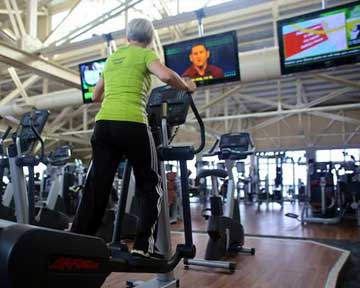Tenosynovitis is a common overuse injury that frequently occurs in conjunction with tendonitis. It is an inflammation response to repetitive strain that can be very painful, but can be treated easily and conservatively. Our Physiotherapists a Liverpool Physio are experienced in assessing and treating all kinds of tenosynovitis.
Tenosynovitis is inflammation of the synovium sheath that surrounds the tendons. This sheath acts as a smooth lubricated barrier against friction between the tendon and the surrounding tissues. When the sheath becomes inflamed it can cause pain that inhibits strength and function in the passing tendon. This in turn reduces functional ability in the hand, wrist or foot where the tendon is located.
Tenosynovitis is a condition that usually results from over use of that particular structure. In the case of the hand it may be from excessive typing or other repetitive strain. In the foot it may be due to overtraining from activities like running or skipping. This kind of intensive use can lead to minor damage of the tendon, which when repaired leads to a slight thickening of the tendon. A continual cycle of damage and thickening from repair eventually causes the tendon to agitate the synovium sheath leading to inflammation.
In some cases direct damage to the structures surrounding the tendon sheath allows infection to reach the synovium causing inflammation without the usual wear and tear process. In the limited interstitial space common to the hands, wrist and feet the swelling that occurs from tenosynovitis can further reduce functionality along with pain. It is because the tendons crossing these joints are so long that it makes the hand, wrist and feet more susceptible to tenosynovitis, although it can affect any tendon.
If you have Tenosynovitis you may experience some of the following symptoms;
Our specialist physiotherapists at Liverpool Physio can carry out a comprehensive assessment to diagnose the presence of tenosynovitis. It will include a series of movements of the affected joint along with gentle palpation to isolate which tendon has been affected. In cases where a diagnosis is not clear you may be referred to gain an ultrasound scan, MRI or X-ray.
For more information on how physiotherapy can help treat tenosynovitis, please email office@liverpoolphysio.co.uk or ring us on 0151 558 0077.
At Liverpool Physio, we want to gain as much information as possible about your injury to ensure we give you the best treatment. In your first appointment with us, our physiotherapists will carry out an assessment which has two parts:
A discussion between you and our physiotherapist to find out the cause of your injury and what symptoms you are experiencing, and how your injury is affecting you and your lifestyle.
An assessment of your range of pain, range of movement, and a series of special tests to identify the presence of the tenosynovitis.
At Liverpool Physio, Our physiotherapists will ensure you specialised treatment for your tenosynovitis. Depending on the severity of your injury, your physiotherapy treatment may involve:
At Liverpool Physio you will experience a personalised treatment session. Each appointment will be aimed at returning to your everyday activities and what you enjoy.
If you are experiencing sharp pain or swelling in your hand, wrist or foot, and feel unable to function normally, one of our experienced physiotherapists will be happy to see you for an assessment.
You can contact us directly to arrange an assessment and we can advise you if further treatment is recommended, or give you details on self-management for minor cases. To arrange an appointment please email office@liverpoolphysio.co.uk or call 0151 558 0077.
Tenosynovitis can be a very painful condition that severely limits normal functionality of the tendons and their associated joints. The hand, wrist and ankle are most commonly affected which can affect your mobility and ability to perform normal daily activities. For the best possible recovery it is important to treat the condition early and follow the advice of the physiotherapists. Fortunately it is easily treated and our physiotherapists can advise you of exercises to minimise the risk of reoccurrence.
At Liverpool Physio we want to ensure you get the best treatment for your injury and we will use pain relief techniques, strengthening exercises and activity specific treatments to help you recover.
For more information on how physiotherapy can help treat tenosynovitis, or to book yourself an assessment, please email office@liverpoolphysio.co.uk or ring us on 0151 558 0077.
↑ Back to top
What is Tenosynovitis?
Tenosynovitis is inflammation of the synovium sheath that surrounds the tendons. This sheath acts as a smooth lubricated barrier against friction between the tendon and the surrounding tissues. When the sheath becomes inflamed it can cause pain that inhibits strength and function in the passing tendon. This in turn reduces functional ability in the hand, wrist or foot where the tendon is located.
What causes Tenosynovitis?
Tenosynovitis is a condition that usually results from over use of that particular structure. In the case of the hand it may be from excessive typing or other repetitive strain. In the foot it may be due to overtraining from activities like running or skipping. This kind of intensive use can lead to minor damage of the tendon, which when repaired leads to a slight thickening of the tendon. A continual cycle of damage and thickening from repair eventually causes the tendon to agitate the synovium sheath leading to inflammation.
In some cases direct damage to the structures surrounding the tendon sheath allows infection to reach the synovium causing inflammation without the usual wear and tear process. In the limited interstitial space common to the hands, wrist and feet the swelling that occurs from tenosynovitis can further reduce functionality along with pain. It is because the tendons crossing these joints are so long that it makes the hand, wrist and feet more susceptible to tenosynovitis, although it can affect any tendon.
What are the symptoms of Plantar Fasciitis?
If you have Tenosynovitis you may experience some of the following symptoms;
- Pain when actively moving a joint, particularly the Wrist, Hand or Ankle.
- Pain persists even when you passively move the joint.
- Swelling in and around the affected joint or area.
- Unable to fully extend wrist, fingers or toes in affected area.
- Reduced mobility and weakness in the joint.
- Catch / release sensation in the tendon as you move the joint.
- Redness along the length of the tendons path.
- Following a cut or puncture wound, you see the above signs of infection.
How is Tenosynovitis Diagnosed?
Our specialist physiotherapists at Liverpool Physio can carry out a comprehensive assessment to diagnose the presence of tenosynovitis. It will include a series of movements of the affected joint along with gentle palpation to isolate which tendon has been affected. In cases where a diagnosis is not clear you may be referred to gain an ultrasound scan, MRI or X-ray.
For more information on how physiotherapy can help treat tenosynovitis, please email office@liverpoolphysio.co.uk or ring us on 0151 558 0077.
What would a physiotherapy assessment for Tenosynovitis involve?
At Liverpool Physio, we want to gain as much information as possible about your injury to ensure we give you the best treatment. In your first appointment with us, our physiotherapists will carry out an assessment which has two parts:
Subjective
A discussion between you and our physiotherapist to find out the cause of your injury and what symptoms you are experiencing, and how your injury is affecting you and your lifestyle.
Objective
An assessment of your range of pain, range of movement, and a series of special tests to identify the presence of the tenosynovitis.
What would physiotherapy treatment for Tenosynovitis?
At Liverpool Physio, Our physiotherapists will ensure you specialised treatment for your tenosynovitis. Depending on the severity of your injury, your physiotherapy treatment may involve:
- Joint mobilisations of the affected area.
- Rest, avoiding tasks that aggravate the condition
- Ice treatments, to reduce pain and swelling.
- Heat treatments to reduce pain.
- Strengthening exercises.
- Soft tissue massage.
- Stretches.
- Electrotherapy
- Advice on activity modification and use of splints.
At Liverpool Physio you will experience a personalised treatment session. Each appointment will be aimed at returning to your everyday activities and what you enjoy.
How can I arrange a physiotherapy assessment for Tenosynovitis?
If you are experiencing sharp pain or swelling in your hand, wrist or foot, and feel unable to function normally, one of our experienced physiotherapists will be happy to see you for an assessment.
You can contact us directly to arrange an assessment and we can advise you if further treatment is recommended, or give you details on self-management for minor cases. To arrange an appointment please email office@liverpoolphysio.co.uk or call 0151 558 0077.
Summary
Tenosynovitis can be a very painful condition that severely limits normal functionality of the tendons and their associated joints. The hand, wrist and ankle are most commonly affected which can affect your mobility and ability to perform normal daily activities. For the best possible recovery it is important to treat the condition early and follow the advice of the physiotherapists. Fortunately it is easily treated and our physiotherapists can advise you of exercises to minimise the risk of reoccurrence.
At Liverpool Physio we want to ensure you get the best treatment for your injury and we will use pain relief techniques, strengthening exercises and activity specific treatments to help you recover.
For more information on how physiotherapy can help treat tenosynovitis, or to book yourself an assessment, please email office@liverpoolphysio.co.uk or ring us on 0151 558 0077.
↑ Back to top

 Above: Tenosynovitis causes the tendons along the top of our foot to become inflammed
Above: Tenosynovitis causes the tendons along the top of our foot to become inflammed














